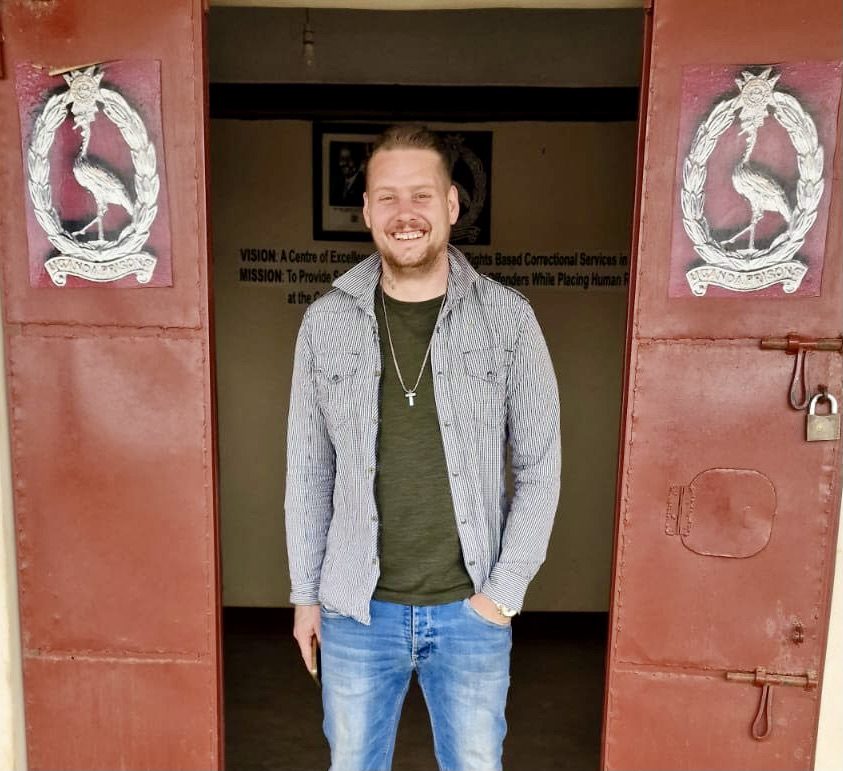
An eye opening trip to visit Uganda prisons
As part of our Employability project, this summer two current Longford Scholars won travelling scholarships to spend five weeks working with the charity Justice Defenders in Ugandan prisons. One of the two, Wayne, reflects in conversation on what he gained by the experience
Why did you apply to go to Uganda?
The opportunity immediately spoke to me – to my passions, and to my personal and professional experiences. I was about to graduate in my BA (Hons) degree in Youth Work and Community Development. My own experiences of the criminal justice system as a whole are what motivate me. Having the chance to experience how it operates in Uganda seemed too good to miss.
As I have become more reflective about my own adverse childhood experiences that resulted in abandonment, helplessness, homelessness, drug addiction and imprisonment, I have been questioning what my next steps in life should be, how can I use my lived experienced and the academic knowledge I have gained to make a real difference in the world? This informed my wish to go to Uganda.
What were you expecting to find there?
I didn’t really know. I was aware of where Uganda currently is economically, and that it was going to be a culture shock in comparison to conditions in prisons in the UK.
How was it different from what you were expecting?
Seeing something with your own eyes can be difficult to process. It was clear that there is a lot of need there. It could leave me feeling overwhelmed and helpless over where to begin, or what to do to support those going through a system that gives them such limited support upon release. It just places them back in the cycle of fighting to survive. It was hard to witness.
What was it like going into a Ugandan prison?
Thanks to Justice Defenders, we were welcomed by the prison staff but, once inside, it quickly became daunting. It was overcrowded and there were limited opportunities for education or work as part of rehabilitation. That was having an adverse effect on the prisoners’ physical and psychological wellbeing.
One of the main things that struck me was that there were a lot of officers who genuinely wanted to help those in prison. There was almost a camaraderie between prisoners and staff. They all seemed to understand that people were often committing crimes just to survive. Many prisoners had been unable to defend themselves in court, or didn’t have the means. They did not know how to challenge the criminal justice system, or even how the process worked.
What did you get involved in there?
In the prisons there were opportunities for us to meet prisoners and share our own lived experiences and encourage them that none of us are defined by our past. This was particularly challenging in a completely different culture with often extreme barriers and no obligation on the government for support on release such as housing or a benefit system. Among the topics we discussed were preparing for re-integration into community, anger management and drug awareness. We shared tools to help with dealing with these issues. These conversations created a safe space for the prisoners to open up and be truly heard.
Did you feel you made a connection with those you met in the prison?
It is difficult to build connections in short doses as we visited multiple prisons. One of the main ways was by sharing personal stories and vulnerabilities so as to build connection through the emotions we have all experienced.
How was it working with Justice Defenders?
All of those I encountered made me feel welcome and looked after. I built some meaningful friendships that I will continue to build on.
What did you gain by going to Uganda?
It has opened my eyes to the fact that, although we have our own challenges within our country, we are extremely fortunate in comparison to others around the world. We should remember and appreciate that. It has helped me identify more clearly that I want to be involved in social change/justice and that we are not limited to just our own community to do that. There are people in the world who need support and help and we are blessed here, able to go and make a real difference in others’ lives.
Our travelling scholarships are supported by the Henry Oldfield Trust. We will be sending two more scholars to Uganda in the summer of 2023. Any past or present scholars interested in applying should contact our Employability Manager, Abi Andrews.